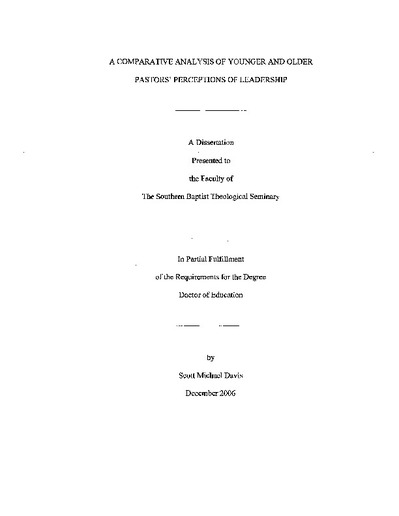A comparative analysis of younger and older pastors' perceptions of leadership
Abstract
This dissertation is a comparative analysis of the leadership perceptions of older and younger pastors. The research concern is introduced in chapter one with a question raised by critics of the evangelical church within the Emerging Church movement concerning the substitution of a CEO model of pastoral ministry.
This question caused the researcher to examine a literature base to establish the credibility of the criticism. Pertinent literature was examined regarding the use of metaphor to describe leadership, biblical and exegetical foundations for leadership, secular leadership and managerial studies, and philosophical and socio-cultural issues that impact current church leaders.
The research involved the use of a questionnaire on issues related to polity, power, control, authority, and leadership assumptions. Once the questionnaires were received, appropriate statistical measures were used, including the Chi Square Test for Independence and Chi Square Goodness of Fit, correlational analysis, and t-tests.
Analysis of the data revealed significant relationships between the concepts of metaphor, polity, and age. The most significant findings were related to the interrelationship of generation, ideal polity and metaphor. Research on polity indicated a revival of interest in the plural elder polity model. Regarding the concept of metaphor, a significant relationship was discovered between the concept of elder polity and the arts metaphor. Both of these results were significant trans-generationally. These findings were reported in detail and displayed according to each of the pertinent research questions.
Keywords: Emerging church, metaphor, polity, philosophy of leadership, philosophy of ministry, older pastor, younger pastor, ministry, power, control, authority.

